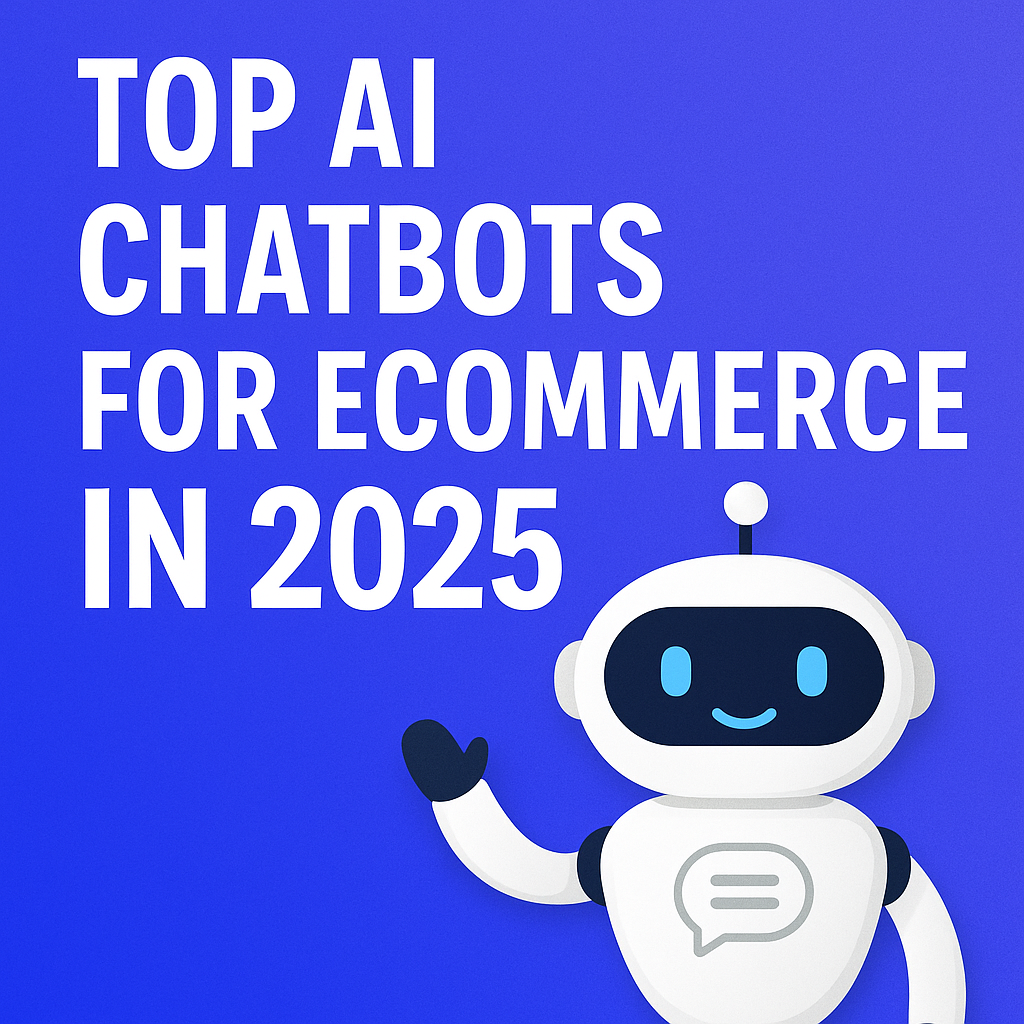The landscape of online retail is evolving rapidly, and at the heart of this transformation is the AI chatbots for eCommerce. These intelligent virtual assistants are revolutionizing how businesses interact with customers—offering real-time support, personalized recommendations, and frictionless shopping experiences across digital channels. As artificial intelligence continues to refine customer journeys, AI chatbots are becoming the go-to solution for brands looking to enhance service and streamline operations.
In the last few years, AI chatbots have once again come to life for the first time since the 70s, with improved intelligence and human understanding through the use of NLP, advanced machine learning, and deep data integrations. By 2025, they’re not merely just helpful; they are essential. Whether for managing thousands of customer inquiries or leading purchasers on bespoke journeys, AI chatbots have proven to be invaluable resources for brands seeking to future-proof their businesses in the face of a growing digital economy.
But selecting the best AI chatbot is now more critical than ever. The ideal choice goes beyond FAQs to something that is learning from interactions, connected to backend systems such as CRM and inventory, and providing an omnichannel experience that feels human. So, in this guide, we look over the best AI chatbots for eCommerce of 2025 and what you get, along with use cases, pros and cons, and how they can fit with your business goals.
Key takeaways of AI chatbots for eCommerce
| Chatbot Name | Platforms Supported | Personalization | Integrations | Price | Best For |
| Tidio AI | Shopify, Wix, WordPress | Yes | Shopify, Messenger, Zapier | $$ | Small to Medium eCommerce stores |
| Gorgias | Shopify, Magento, BigCommerce | Yes | Klaviyo, Shopify, Gmail | $$$ | High-volum customer support |
| Zendesk AI | Web, Enterprise Platforms | Yes | Extensive app marketplace | $$$$ | Large Enterprise and global support teams |
| Shopify Inbox | Shopify only | Basic | Shopify-native | Free | Shopify sellers who desire native integration |
| Intercom FIN AI | Web, SaaS, Custom | Advanced | CRM, help docs, APIs | $$$$ | SaaS, DTC brands using Intercom |
| Heyday | Shopify, Facebook, Instagram | Yes | Salesforce, Messenger, Shopify | $$$ | Retail & social commerce brand |
| Botsonic | Web, No-code Platforms | Yes | Zapier, custom web embed | $$ | Startups, content based ecommerce |
| Re:amaze | Shopify, WooCommerce, BigCommerce Shopify, WooCommerce, BigCommerce | Basic | Shopify, email, chat | $$ | Brands that require hybrid live + automated chat |
| ManyChat | Instagram, Facebook, WhatsApp | Yes | Shopify, Meta, Zapier | $$$ | Social commercerce and influencer shops |
| Octane AI | Shopify | Advanced | Klaviyo, Facebook Messenger | $$$ | Shopify Stores using quiz/product discovery |
Best ai chatbots for eCommerce in 2025

And here’s a roundup of the top AI chatbots that are reshaping eCommerce in 2025. Each tool has been created to help with customer engagement, automating tasks, and conversions.
Tidio AI
The platform offers live chat, AI chatbots, and a desk in one, making it one of the best solutions for small and medium-sized eCommerce stores.
Key Features:
➤ Lyro AI: The conversational AI Assistant
➤ Omnichannel support (chat, Messenger, email)
➤ Shopify, Wix and WordPress connections
➤ Custom no code chatbam flows
Good Sides:
- Easy to set up
- Affordable for the small business.
- Live visitor tracking
Drawbacks:
- Limited advanced analytics
Best For:
Small to mid-sized eCommerce businesses seeking reasonably priced automation.
Pricing: Free plan; premium plans from $29 per month.
Gorgias
Gorgias is an e-commerce help desk powered by AI, and it best serves Shopify, Magento, and BigCommerce users.
Key Features:
➤ Automated responses to FAQs
➤ Artificial intelligence-based sentiment detection
➤ Shopify, Klaviyo,c.: Deep Shopify Integrations.
➤ Single customer view across multiple channels
Good Sides:
- eCommerce-tailored automation.
- Great integration with Shopify
- Macros and intention-driven workflows
Drawbacks:
- Can be costly at high ranks
- Some functions need to be train to be use well
Best For:
Growing eCommerce brands with high volumes of support.
Pricing: From $10 per user per month (ticket-based pricing); higher tiers for automation tools.
Zendesk AI
Zendesk’s AI is part of its support suite and provides solid AI tools that you can use for automation, triage, and customer intelligence.
Key Features:
➤ AI tickets summaries and intent identification
➤ Advanced bot builder
➤ Workflow automation
➤ Multilingual support
Good Sides:
- Commercial-grade reliability
- Powerful reports and data analysis
- Scalable for global brands
Drawbacks:
- Higher learning curve
- Expensive for small teams
Best For:
Big companies are in search of an AI support model that can be tailored to their needs.
Pricing: Begins at roughly $55/agent/month.
Shopify Inbox (with AI enhancements)
Shopify adds AI driven solutions to native messaging app AI-based capabilities added to the native messaging app let merchants do personalized automation and product recommendations.
Key Features:
➤ Artificial Intelligence-Led Customer Communications
➤ Product recommendation engine
➤ Seamless Shopify integration
➤ Mobile app support
Good Sides:
- Free for Shopify users
- Seamlessly integrates with product catalog
- Easy setup
Drawbacks:
- Limited in features beyond Shopify
- Much just still at antiuqbe compared to 3rd party chatbots
Best For:
Shopify vendors who want built-in automation without 3rd party apps.
Pricing: Free with all Shopify plans.
Intercom Fin AI
Fin The AI-powered support assistant that learns from your support content and delivers accurate answers instantly Intercom’s newest support assistant is powered by AI and trained on your support content to help your team be more efficient.
Key Features:
➤ GPT-4-based support chatbot
➤ Self training from help center and chat history
➤ Escalation to human agents
➤ Built on top of Intercom’s CRM
Good Sides:
- Very accurate responses
- Context-aware automation
- Out of box compatibility with Intercom
Drawbacks:
- Premium pricing
- Requires Intercom ecosystem
Best For:
High-growth SaaS and DTC brands that use Intercom.
Pricing: Custom pricing; Fin AI charged independently based on usage.
Heyday by Hootsuite
Heyday is the leading artificial intelligence (AI) company that is revolutionizing retail by being the first and only AI platform dedicated to 1:1 shopping experiences and assisting customers with online purchases.
Key Features:
➤ AI chatbot in a product search, order tracking
➤ Social commerce amalgamations (Facebook, Instagram)
➤ Understanding of natural language
➤ Multilingual support
Good Sides:
- Emphasis on social commerce
- Retail-specific AI flows
- Integration with Shopify, Salesforce
Drawbacks:
- Not ideal for B2B
- Can require setup help
Best For:
If you are retail brands invested in a social selling strategy.
Pricing: Begins at about $49 per month; custom pricing for enterprise.
Botsonic (by Writesonic)
Botsonic Botsonic is a no-code AI chatbot building platform with GPT-4 that provides plug and play chatbot experiences for eCommerce brands.
Key Features:
➤ Train bots using website data
➤ Drag-and-drop interface
➤ GPT-based conversation flow
➤ Supports multiple languages
Good Sides:
- Easy deployment
- Strong content generation
- Affordable for startups
Drawbacks:
- Limited native integrations
- Lacks deep analytics
Best For:
Companies and content shops with a startup culture who just want to get the job done and in need of chatbots.
Pricing: Begins at $49 a month; premium levels for more advanced AI.
Re:amaze
Re:amaze Multichannel customer messaging platform combining a live chat support interface with in-app messenger, email, and a customer knowledge base.
Key Features:
➤ Chatbots and workflows that are configurable
➤ Live chat and email ticketing are built into the system
➤ Shopify, BigCommerce and WooCommerce integration
➤ Embed your FAQ or help Desks
Good Sides:
- Unified messaging dashboard
- Ecommerce platform integration with depth
- Affordable tiers
Drawbacks:
- UI can feel dated
- Not as many AI capabilities00 vs. Riva 24 AI)
Best For:
Companies in search of a happy medium between live support and automation.
Pricing: Starts at $29/month/user.
ManyChat
ManyChat is the industry leader in chatbot automation on Instagram, Facebook Messenger, and Whatsapp – perfect for social commerce.
Key Features:
➤ Messenger and Instagram bots
➤ Product recommendation flows
➤ Shopify – Zapier integration If you have your own store on Shopify that you want to connect, you can use Zapier.
➤ Automation of broadcasting and comments
Good Sides:
- Social media-native
- Easy to build campaigns
- Free plan available
Drawbacks:
- Few outside social channels
- Some limits on Meta’s platforms
Best For:
Instagram and Facebook store owners stressed the importance of DMs and engagement.
Pricing: Offer high supportFree plan is available; Pro plan is from $15 per month.
Octane AI
Octane AI enables Shopify stores to increase conversion rates using quiz funnels, AI chatbots, and product discovery tools.
Key Features:
➤ Chat-based product quizzes
➤ AI-driven recommendations
➤ integrations With SMS and Messenger
➤ Shopify sync
Good Sides:
- High-converting quiz funnels
- Data-rich insights
- Tailored for Shopify
Drawbacks:
- Niche use case
- Expensive for small stores
Best For:
Shopify brands that are focused on the personal touch and product discovery.
Pricing: Begins at $50/month; custom pricing for higher traffic stores.
Selecting the Perfect eCommerce AI Chatbot
There are so many AI chatbot choices available in 2025 so how do you pick the right chatbot for your eCommerce business? absurd.” But it’s not! Here’s what matters: Become a Morning Person To have a more productive new year, transform yourself into a morning person.
Business Size and Requirements
Begin by assessing the scope of your operations. For small businesses, a plug-and-play solution such as Tidio or ManyChat are easy to deploy as well as manage. It’s possible that those bigger or scaling companies require enterprise-level tools such as Zendesk AI or Intercom Fin AI, which can provide deeper automation and integration features.
Budget Constraints
AI chatbots have prices that go all the way from free tools to enterprise-grade subscriptions.
- Freemium and cheap alternatives: Shopify Inbox, Tidio, ManyChat
- Middle-of-the-road options: Re:amaze, Botsonic, Heyday
- Top-tier offerings: Gorgias, Intercom, Zendesk
Pick a tool that won’t break the bank but also grows with you.
Required Integrations
Think about the platforms and tools your business is already on. Do you want integration to Shopify (if you are selling online), CRM tools, email marketing tools such as Klaviyo, or helpdesk support like gmail or salesforce? Services such as Gorgias, Heyday, and Re:amaze are great at multi-platform integration.
Use Case: The difference between Support vs Sales vs Marketing Automation
Decide on the main purpose of the chatbot:
- Support: Zendesk AI, Gorgias
- Sales support and product discovery tools: Octane AI, Heyday
- Marketing and engagement automation: ManyChat, Intercom Fin AI
Some tools focus on being a tool, and others provide an adaptable way of working that can span multiple domains.
AI Capabilities Generative vs. Rule-Based
Generative AI chatbots like Intercom Fin AI, Botsonic etc. can engage in dynamic and natural conversations using large language models. If you require adaptive and intelligent responses, pick tools with advanced NLP and generative AI support.
Ease of Use and Setup
There are cases where not every business can afford technology that’s as sophisticated or that fast.
- Intuitive interfaces: Tidio, Botsonic, Shopify Inbox
- More advanced solutions: Intercom, Zendesk (more feature rich, but has a steep learning curve)
Search for chatbot platforms that align with your technical capacities and the size of your team.
Final Thoughts
Through modern AI chatbots, stores can take services beyond the iterations of basic support to the realms of growth, automation, and customer satisfaction throughout the eCommerce business. In 2025, they’re no longer a nice thing to have, they’re critical to staying competitive.
Try out a couple different platforms, before you put a ring on it, a lot of them have free trials or freemium plans. Consider how they plug into your stack, how easy they are to use and how they fit with your own goals (whether that is for support, sales or marketing).
Frequently asked questions (FAQs)
-
What are AI chatbots for eCommerce?
AI chatbots for eCommerce are intelligent virtual assistants powered by technologies like machine learning, natural language processing (NLP), and deep data integration. They automate customer interactions, help with product recommendations, order tracking, and provide real-time assistance, all while enhancing user experience and boosting conversion rates.
-
Which AI chatbot is best for small eCommerce businesses?
For small to mid-sized eCommerce stores, Tidio AI and ManyChat are top choices. They offer easy setup, affordability, and key features like live chat, integrations with platforms like Shopify, and personalization—all without requiring complex technical know-how.
-
Are AI chatbots worth it for online stores?
Yes, AI chatbots significantly reduce response times, streamline operations, and improve customer engagement. They can handle multiple inquiries simultaneously, increase sales through intelligent upselling, and reduce cart abandonment by guiding users in real-time, making them a smart investment for any online store.
-
How do I choose the right AI chatbot for my eCommerce store?
Consider factors such as your store’s size, budget, primary goals (support, sales, or marketing), required integrations (e.g., Shopify, Klaviyo), and AI capabilities (generative vs. rule-based). Use free trials to evaluate ease of use, automation features, and how well the chatbot fits into your existing tech stack.
-
What are the latest trends in AI chatbots for eCommerce in 2025?
In 2025, key trends include the rise of generative AI chatbots (like those using GPT-4), omnichannel support, personalized shopping assistants, and deep integrations with sales platforms. AI bots are now more human-like, data-driven, and essential for providing seamless and scalable customer experiences.










